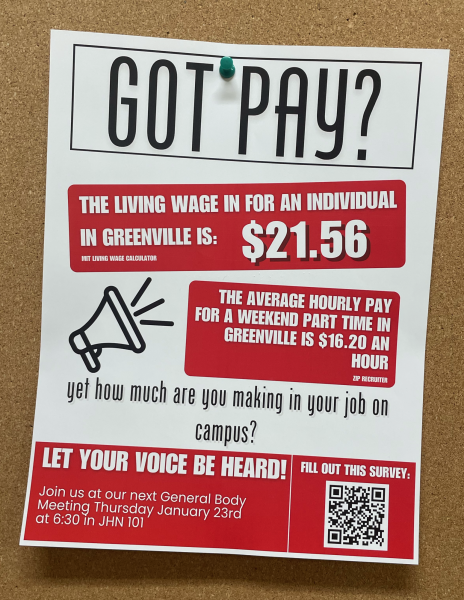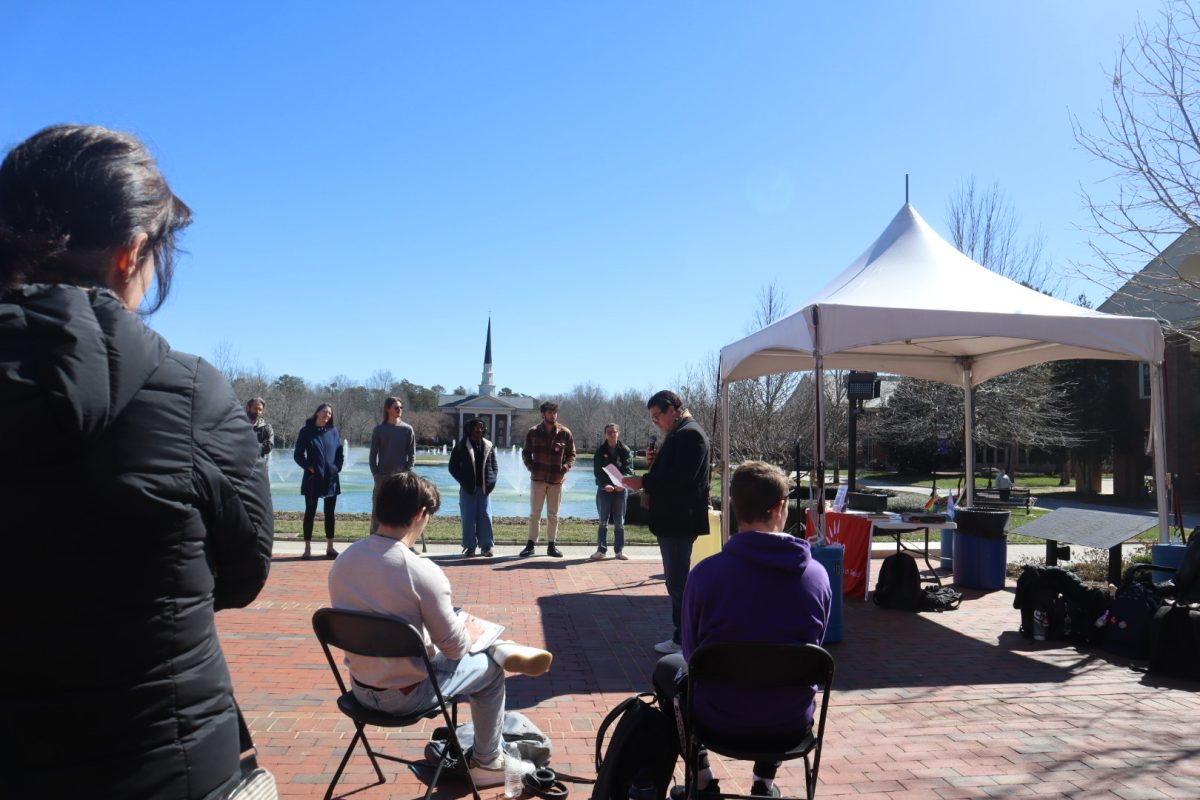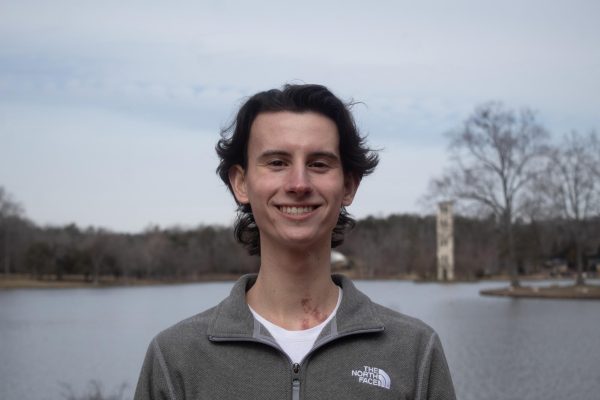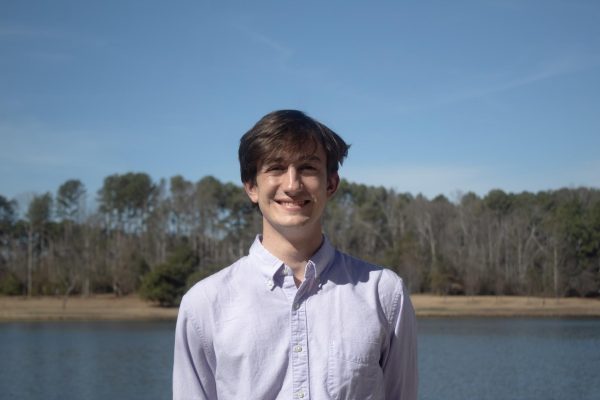Editor in Chief Carter Ozburn and Managing Editor Clay Wallace sat down with Furman University President Elizabeth Davis on March 26, 2025 to discuss some of the most controversial issues on campus. Here’s what we learned.
According to Davis, faculty will receive salary raises for the 2025-26 academic year, which was announced to faculty and staff on March 25. The news comes after a pay freeze implemented in May 2024, which halted raises for all faculty and staff during the 2024-25 academic year.
As previously reported by The Paladin, Faculty Council Chair Brandon Inabinet calculated that faculty real pay has fallen approximately 10% since 2021 after raises failed to keep up with inflation following the COVID-19 pandemic.
Davis did not state how much faculty salaries will increase, nor did she indicate whether raises will match inflation. This is increasingly pertinent as economists predict that U.S. President Donald Trump’s tariff policies will raise inflation in the near future.
The pay freeze sparked controversy after faculty and students discovered that Davis’ salary increased by 73% — approximately $360,000 — between the 2022-23 and 2023-24 academic years.
Davis previously told The Paladin that the salary increase reflected deferred compensation. She has now provided further insight, stating that she was contractually obligated to accept the 2023-24 salary increase. She did not share this information with The Paladin when interviewed in the fall.
“It was contractually determined in 2017, and there were actually legal choices I had to make about when. I could have either let it go for ten years or five, and I elected for it to go for five,” Davis said.
Controversy about Davis’ salary increase amidst a faculty pay freeze has contributed to conversations about faculty and student pay.

In recent months, Furman Young Democratic Socialists of America have been conducting the Wage Justice Campaign, which advocates for Furman employees to be paid a living wage. They have garnered over 500 signatures on a petition demanding regular, guaranteed pay increases and pay transparency for all campus workers.
Despite being aware of the campaign, Davis expressed a lack of knowledge about YDSA’s specific demands or how they define a living wage. This comes after a months-long campus flyer campaign by YDSA, which advertised the living wage for Greenville as calculated by the MIT Living Wage Calculator.
“There’s sort of the vagueness of a living wage. I don’t know what that number is,” Davis said. “Has anyone said what the living wage is?”
Davis described YDSA’s demands as a “reasonable request,” stating that student wages do not receive regular review.
“The first step is doing exactly what YDSA and other groups are doing: bringing these things to the attention of the administration, and then everything gets run through the budget process the same way,” Davis said about the university’s process for ensuring fair student employee compensation.
Other members of the administration are responsible for managing student wages, according to Davis. She was not aware of any administration-level efforts to engage with YDSA or collect student feedback about campus employment.
“I really don’t want this to seem as if I’m pushing this off, but the areas that work with students in their wages, those are the ones who really need to take a look at what is the work, what are students being asked to do, and what the appropriate wages are,” said Davis.
To address the financial issues underpinning the pay controversies on campus, Furman University began working with Bain & Company, a consulting firm, last year. The primary goal of the project is to decrease expenditures and increase revenue.
Davis reaffirmed details about the project previously reported on by The Paladin. She also confirmed that no academic programs would be cut as a result of the firm’s recommendations.
“That’s the kind of thing that you see when you think about the broader landscape [of] institutions that are in real peril. They start cutting humanities, departments, languages, classics, and that’s not the kind of thing that we’re doing here,” Davis said.
Students should expect to learn about the resulting changes as they are implemented. According to Davis, no final report containing Bain & Company’s recommendations will be published, and no community-wide town hall will be held.
Students have also expressed concerns about the potential for federal policy shifts, in addition to the Bain project, to incite structural changes that alter the fundamentals of life at Furman.
As universities across the country make changes to comply with Trump’s executive orders targeting diversity, equity and inclusion initiatives, students have called for the continuation of DEI programming at Furman.
According to Davis, DEI efforts are here to stay at Furman, although the university plans on ensuring it more clearly communicates their aims and reduces the use of politicized language.
“One thing that we had started even before the actual executive orders came out of Washington was trying to make clearer what our DEI efforts were designed to do. There is a lot of speculation that anytime you see the letters DEI, it’s about giving someone an advantage not based on merit, but based on skin color, gender identity, and that’s not what we’re doing here,” Davis said.
However, other groups in the broader Furman community, like the Furman Free Speech Alliance, have expressed opposition to Furman’s DEI policies, including a required statement that professors seeking employment at the university must write about their commitment to DEI.
Davis indicated openness to reviewing the language of the DEI prompt, but she emphasized that the prompt’s purpose is to gauge how applicants will support diverse learning styles.
“I think there’s always a point where you want to say, ‘Are we really giving them the prompts to tell us what we want to know?’ What we want to know is people’s approaches to teaching, people’s approaches to doing research,” Davis said about the DEI prompt used in hiring. “If students learn differently, they need to have access to different resources.”
Federal policy changes have already jeopardized funding and academic freedom at other universities, such as Columbia University.
Davis stated that the university currently plans to keep curriculum and research under faculty purview. However, she was unable to guarantee the continuation of this policy amidst America’s volatile political climate.
“I can’t say that because I don’t know what may come. The plan is to be as strong and as steadfast as we can be. But again, there could be some risk,” Davis said, when asked if she will protect academic freedom against potential direct challenges by the federal government. However, an “existential crisis” would be necessary for the university to reconsider its current stance, according to Davis.
To students who are concerned about what is happening on campus or across the country, Davis has a message:
“It’s a crazy time in the world. It’s crazy for higher-ed right now, but our commitment is to students having the best educational experience that we can provide,” Davis said. “Furman’s still a great place to be, and I think what this is teaching us is how to really manage our true priorities — our true mission — and not get sidetracked by other things that are dangling in front of us and may take our attention off what’s really important.”
How do you feel about President Davis and the Furman University administration? The Paladin is currently collecting student opinions about the administration, and we want to hear your voice. Click here to complete our survey, which will be open until 12 PM on Friday, April 18.






































